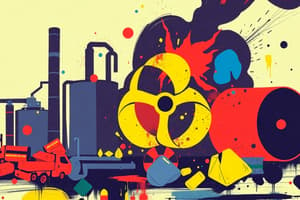Podcast
Questions and Answers
How are most industrial wastes disposed of, and how has this changed over the past 25 years?
How are most industrial wastes disposed of, and how has this changed over the past 25 years?
Most industries dispose of their waste through municipal sewage treatment systems. Industries are no longer allowed to use water and return it to its source in poor condition since 1972.
What is thermal pollution and how can it be controlled?
What is thermal pollution and how can it be controlled?
Thermal pollution occurs when an industry removes water from a source for cooling purposes and then returns the heated water. It can be controlled by using cooling ponds, cooling towers, and dry towers.
Describe primary, secondary, and tertiary sewage treatment.
Describe primary, secondary, and tertiary sewage treatment.
Primary sewage treatment removes larger particles through screens and settling in ponds. Secondary treatment involves bacteria degrading organic material, and tertiary treatment employs various techniques to remove remaining dissolved pollutants.
What are the types of wastes associated with agriculture?
What are the types of wastes associated with agriculture?
Why is stormwater management more of a problem in an urban area than in a rural area?
Why is stormwater management more of a problem in an urban area than in a rural area?
What is groundwater mining?
What is groundwater mining?
How does irrigation increase salinity?
How does irrigation increase salinity?
What are the three major water services provided by metropolitan areas?
What are the three major water services provided by metropolitan areas?
Flashcards are hidden until you start studying
Study Notes
Industrial Waste Disposal
- Most industrial waste is disposed of through municipal sewage treatment systems.
- Since 1972, industries are prohibited from returning polluted water to its source without prior treatment.
- Water must be cleaned before it is reintroduced into natural waterways.
Thermal Pollution
- Occurs when industries extract water for cooling and return it heated to its source.
- Can be controlled using methods like cooling ponds, cooling towers, and dry towers.
Sewage Treatment Stages
- Primary treatment: Filters out larger particles via screens and allows settling in ponds or lagoons.
- Secondary treatment: Follows primary treatment, using bacteria to degrade organic material in wastewater.
- Tertiary treatment: Employs various techniques to eliminate dissolved pollutants remaining after primary and secondary treatments.
Agricultural Waste Types
- Includes animal manure, excess animal feed, and spillage of fertilizers and pesticides.
Stormwater Management Challenges
- In urban areas, stormwater runoff from streets and buildings is routed directly to sewer systems for municipal treatment.
- In contrast, rural areas allow stormwater to either infiltrate the soil or flow into rivers.
Groundwater Mining
- Refers to the extraction of water from aquifers at a rate faster than it can naturally replenish.
Irrigation and Salinity
- Irrigation practices can increase soil salinity as extracted water leaves behind concentrated salts.
Water Services in Metropolitan Areas
- Metropolitan regions must provide essential services:
- Safe water supply for human and industrial usage
- Wastewater collection and treatment systems
- Stormwater collection and management.
Studying That Suits You
Use AI to generate personalized quizzes and flashcards to suit your learning preferences.




